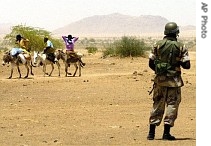2006年VOA标准英语-US Senator Plans Revised Legislation on Darfur(在线收听)
By Dan Robinson
Washington
09 September 2006
 Rwandan soldier guard on the outskirts of Thabit, North Darfur |
||
-----
House and Senate Republicans and Democrats have been closely monitoring the deteriorating situation in Darfur with alarm.
This week, Democratic Senator Joseph Biden, the ranking Democrat on the Senate Foreign Relations Committee, drew applause during a speech at Washington's National Press Club when he compared the situation in Darfur with other world trouble spots that required the use of military force by the United States.
"Civilized societies have a responsibility to protect innocents and to prevent catastrophic events. That is why force was necessary in Bosnia, and why I was the first one to call for its use. That's why force was necessary in Kosovo. That's why force was necessary in Afghanistan. And I would argue respectively, that is why force is necessary in Darfur right now," he said.
Senator Biden is sponsoring a bipartisan resolution urging President Bush to take steps to gather international support to establish a no-fly zone in Darfur to head off new Sudan government attacks from the air on civilians.
The measure also urges the international community to impose economic and diplomatic sanctions on the government in Khartoum, repeats a call for President Bush to appoint a Special Envoy for Sudan, and urges a special session of the UN Human Rights Council to address Darfur.
Earlier this year, the House of Representatives overwhelmingly approved legislation called the Darfur Peace and Accountability Act.
It extends a range of sanctions on Sudan until Khartoum takes concrete steps to disarm government-backed Arab militia blamed for killing and displacing thousands of civilians.
However, with only three weeks remaining in the congressional session, the Senate has not yet taken up the broader legislation.
The matter came up during a recent hearing of the Senate Foreign Relations Committee as Democrat Chris Dodd urged Senator Richard Lugar to hold a hearing on Darfur.
"I'm just wondering if at some point the chairman might consider in the time remaining for us here to maybe even have a public hearing on Darfur. I am deeply alarmed as I think everyone is at the deteriorating condition(s) there [and] the reluctance of the United Nations to step forward," said Dodd.
"It is certainly very timely and I share the senator's concern," replied Lugar.
Senator Lugar has signed on to the separate non-binding resolution sponsored by Senator Biden who says the world must make clear that it will not allow Khartoum to reject the deployment of a U.N. force.
However, on Friday Lugar was forced to issue a clarification on the status of overall Darfur legislation in response to a published report [in The Hill newspaper] which quoted unidentified sources as complaining he was stalling progress on the bill.
The senator blames delay on disagreements over a single sentence in the Darfur legislation relating to divestment campaigns by individual countries. Keeping the language, he says, would be bad public policy and doom the bill in the Senate.
He adds what he calls shifting circumstances in Sudan complicated efforts to craft the legislation, asserting that action by Congress might have interfered with a difficult implementation of the May peace accord for Darfur.
On Monday, Senator Lugar plans to introduce a new version of the Darfur Peace and Accountability Act, without what he calls problematic divestiture language.
The revision, which he says would have a better chance of approval in the Senate as well as House, would also give the State Department new flexibility to provide humanitarian and security-related aid to address the situation in Darfur, and more broadly in southern Sudan.
Meanwhile, U.S. officials appearing at a House hearing tried to assure concerned lawmakers that Washington continues to focus on what Deputy Assistant Secretary of State Erica Barks-Ruggles called a very serious ongoing human rights problem in Darfur and the question of a U.N. force.
"The obvious problem that is caused by the AU (African Union) peacekeepers there having their mandate run out soon and the inability of the U.N. peacekeepers go in behind, is a first and foremost concern for our government, and we remain very, very engaged on that and obviously that will have implications on the human rights situation but we will also remain engaged on the very serious human rights situation that is there," he said.
As for U.S. pressure for the new U.N. Human Rights Council or at the Security Council to take up the situation in Darfur, Ruggles was more cautious saying U.S. officials will have to see how things evolve in the next two weeks while consulting with other governments.